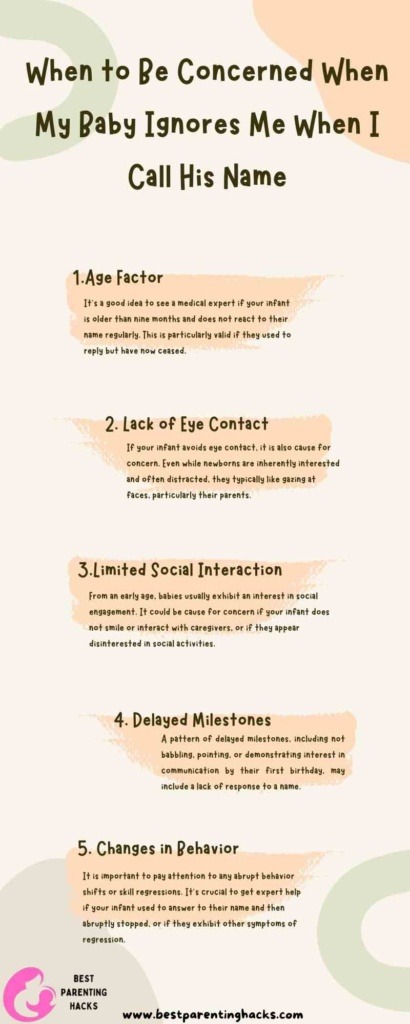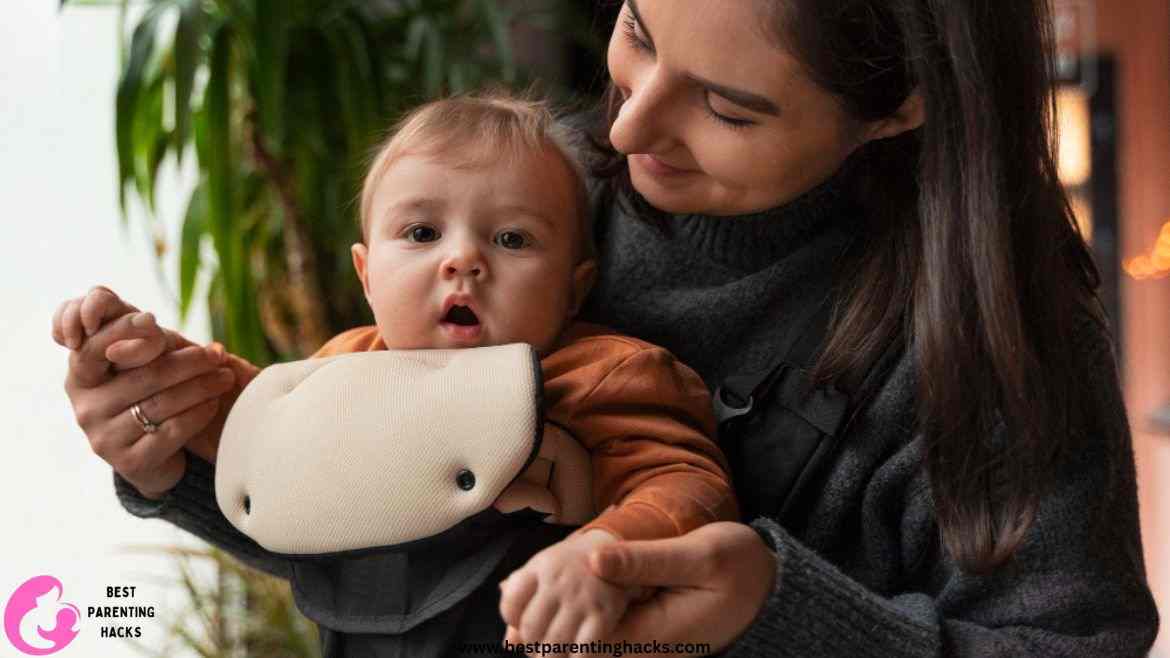Table of Contents
Experiencing the world through a baby’s eyes is an adventure full of learning opportunities, giggles, and occasionally, moments of perplexity. For me, one of those moments was realizing that when I called my baby’s name, he didn’t turn around or react in any way. I initially dismissed it as a peculiarity of his evolving character, speculating that perhaps he was overly immersed in his small investigations. However, as the days grew into weeks and months, I started to get concerned about the silence. Was this typical behavior? Was it too soon for me to anticipate too much? Or did it indicate that something was off? These inquiries sent me to a course that involved an in-depth study of developmental milestones, interviews, and research.
“My baby ignores me when I call his name. what’s the reason?” is a title that begs a more nuanced explanation. It can be caused by a variety of things, from straightforward ones like playfulness or distraction to more complicated ones like hearing, comprehension, or developmental delays. During my quest, I learned that although it’s normal for babies to periodically ignore their parents’ cries out of curiosity about their surroundings, persistent non-response calls for further investigation. One important developmental milestone that denotes a baby’s developing social and cognitive abilities is being able to recognize your name. A newborn may require additional testing to rule out any underlying problems if they don’t react to their name by a specific age every time.

When to Be Concerned
For any parent, learning that their child isn’t developing according to the usual schedule can be frightening. When my kid didn’t react to his name, I recall being a little concerned and perplexed, not sure if I was seeing a case of individual variance or an indication of something more serious. It’s imperative to handle this matter objectively and know when to take action in addition to just observing.
1. Age Factor: It’s a good idea to see a medical expert if your infant is older than nine months and does not react to their name regularly. This is particularly valid if they used to reply but have now ceased.
2. Lack of Eye Contact: If your infant avoids eye contact, it is also cause for concern. Even while newborns are inherently interested and often distracted, they typically like gazing at faces, particularly their parents.
3. Limited Social Interaction: From an early age, babies usually exhibit an interest in social engagement. It could be cause for concern if your infant does not smile or interact with caregivers, or if they appear disinterested in social activities.
4. Delayed Milestones: A pattern of delayed milestones, including not babbling, pointing, or demonstrating interest in communication by their first birthday, may include a lack of response to a name.
5. Changes in Behavior: It is important to pay attention to any abrupt behavior shifts or skill regressions. It’s crucial to get expert help if your infant used to answer to their name and then abruptly stopped, or if they exhibit other symptoms of regression.
In my situation, realizing these elements might be cause for concern led me to move forward and get a professional evaluation. I made this decision out of love and a desire to give my child the best possible support for their development.
You Might Also Like to Read: Can Baby Eat Prunes Every Day?

Understanding the Milestones
More than just a joke, learning to recognize one’s name is an important developmental milestone for a baby’s auditory and cognitive skills. It is the start of language and communication comprehension, a fundamental ability that underpins all subsequent education and social interactions. I mistakenly believed that babies would all respond to their names at roughly the same age, but I soon discovered that development is a process that varies from person to person. Like adults, babies develop and learn at their rate. Some may become alert at the mention of their name as early as four months, while others may require a little longer—perhaps nine or ten months. This variation is entirely typical and is influenced by a wide range of variables, such as social interaction, auditory processing, and individual attention variations.
1. Age Range: Pediatricians and child development specialists generally agree that between the ages of 6 and 9 months, babies usually start to identify and react to their names. At this point, babies begin to realize that the sounds their caretakers make are connected to them.
2. Attention and Focus: Babies are currently developing the ability to filter sounds, which enables them to discern background noise from their names. This growth is essential for language learning and serves as a foundation for more sophisticated auditory processing abilities.
3. Social Engagement: Social development and answering to one’s name are related. It shows that the infant hears and comprehends their name and interprets it as a request to socialize. This acknowledgment is a precursor to the development of empathy and social consciousness.
4. Language Comprehension: This developmental stage is directly related to the onset of language understanding. Babies are on the right track toward understanding words and phrases when they begin to react to their names. This sets the foundation for their first words and beyond.
Knowing these benchmarks provided me with a framework for expectations as well as a path map for tracking my baby’s development. It also made me ready for the chance that I might need to consult a specialist if my child didn’t begin reacting within this wide span.
You Might Also Like to Read: Can a Baby Wear a Hoodie in a Car Seat?

Strategies to Encourage Response
I was concerned when I noticed my son wasn’t responding to his name, but I soon changed my focus to finding ways to encourage his response, which led to a journey of learning, perseverance, and constant effort that was full of challenging and joyful moments.
1. Create a Distraction-Free Environment: My initial move was to reduce outside distractions when we were interacting. I noticed that my infant was able to focus on my voice and eventually his name when we were in a quiet area with minimal toys and background noise.
2. Use the Name Consistently: I made it a point to address him by name every day when we went about our business. I called him by name whenever we interacted, whether it was at playtime, dinner, or bedtime, but I always made sure to get his attention before talking.
3. Positive Reinforcement: I lavished him with smiles, claps, and accolades whenever he even indicated that he recognized his name. He was able to tie his name to the act of replying with the use of positive reinforcement, which proved to be an effective strategy.
4. Engage in Interactive Play: He became more receptive overall by playing games like peek-a-boo and other interactive activities that needed his attention. In addition to being enjoyable, these games helped him learn the value of taking turns while communicating.
5. Seek Professional Guidance: After realizing I required help from experts, I made contact with a speech-language pathologist and a pediatrician. Based on their assessment, they offered specialized tactics that were very helpful in promoting my baby’s development.
Although putting these techniques into practice required perseverance and consistency, the advancements we gained were very satisfying. It served as evidence of the value of early intervention and the effectiveness of proactive engagement.
Professional Assessment and Intervention
I continued to have worries despite having some success utilizing home tactics, so I made the decision that professional involvement was necessary. This choice was a turning point in our journey, allowing me to access a multitude of resources and assistance that I would not have discovered on my own.
1. Initial Consultation: We started by speaking with our pediatrician, who took note of my baby’s behavior and listened to our worries. This consultation was essential in confirming our worries and suggesting more expert assessments.
2. Hearing Assessment: A hearing test was performed because it is crucial to rule out hearing problems. To be sure that my baby’s hearing was not preventing him from responding to his name, this non-invasive technique was necessary.
3. Speech-Language Evaluation: My baby’s communication abilities were evaluated by a speech-language pathologist (SLP), who focused on his comprehension of language, his capacity to produce sounds, and his receptivity to auditory stimuli. This thorough assessment shed light on his language and speech development.
4. Early Intervention Services: We were recommended to early intervention services by the assessments. Depending on the child’s needs, this program provides specialized therapies like speech, occupational, and physical therapy to promote my baby’s growth.
The process of professional assessment and intervention was insightful, providing direction and clarity for promoting my infant’s growth. It emphasized the value of early detection and intervention and gave us the means and approaches to confront the difficulties head-on.

Personal Journey: Seeking Help and Seeing Improvement
I felt a surge of concern when I realized my kid wasn’t reacting to his name. That was the turning point in my parenting adventure that made me decide to get help from a professional. It was difficult but illuminating to find the correct help, go through exams, and put techniques into practice at home.
1. Acknowledging the Concern: Recognizing that there might be a problem was the first step. It’s simple to ignore worries, believing your child will “grow out of it,” but I instinctively understood that holding off wouldn’t be the best course of action. This acknowledgment gave me the motivation I needed to consult a specialist.
2. Choosing the Right Professionals: Putting together the correct group was essential. I sought professionals with knowledge of child development, especially pediatric audiologists and speech-language pathologists. Their knowledge gave me a strong basis for figuring out what my infant needed and what would be the best course of action.
3. The Assessment Process: A battery of tests was used to measure my baby’s hearing, comprehension, and general development. The evaluations were comprehensive. It was a comfort to know that experts would consider my worries and provide a clear course of action.
4. Implementing Strategies at Home: A set of strategies catered to my baby’s needs was provided to us based on the assessment. These included having more direct conversations, speaking in plain, uncomplicated terms, and introducing lighthearted activities that prompted participation and response.
5. Observing Improvement: Eventually, these efforts started to pay off. I have personally experienced the effectiveness of early intervention and focused support. My infant began recognizing his name, interacting with us more, and displaying gains in understanding and communication.

Conclusion
It has taught me a lot to start this process of asking for assistance and to watch my baby’s reaction to his name develop. It made me realize the value of professional assistance, the significance of early intervention, and the strength of parental intuition. If you find yourself in a similar circumstance, keep in mind that the first step in solving your problems is admitting your worries. Making the correct expert decisions and implementing the suggested techniques can have a big impact on your child’s growth. Although there will be obstacles along the way, the development your child makes will be incredibly satisfying. Have faith in the procedure, adhere to the tactics, and acknowledge each little accomplishment. Your actions will set the stage for your child’s growth and development, strengthening your relationship and laying the groundwork for their future interactions and education.
FAQs
Why does a baby’s ability to respond to their name matter?
One of a baby’s most significant developmental milestones is responding to their name. It means they can identify with you as distinct people and that they can comprehend that you are speaking to them. The basis of social interaction and communication is this recognition.
Even if a newborn doesn’t react to its name, may their hearing still be normal?
Yes, even if a baby doesn’t react to their name, their hearing may still be normal. There are several reasons why there might be no response, such as divergence, differences in developmental stages, or concentrating on other hobbies. But it’s crucial to rule out any hearing problems with a qualified evaluation.
How can I determine whether a more serious issue or distraction is to blame for my baby’s lack of response?
If your kid often ignores their name in a variety of contexts, there may be a deeper issue at hand than simple distraction. To evaluate their overall development, look for additional indications of developmental delays or speak with a specialist.
What should I do in the first instance if I’m worried about my baby’s development?
See your pediatrician or a pediatric specialist as soon as possible. They can direct you to the appropriate specialists, including developmental psychologists or speech-language pathologists, for a thorough evaluation.
How do medical experts evaluate a baby’s name-recognition skills?
To examine a baby’s overall development, hearing, and cognition, professionals employ a range of examinations. These could involve interactive games, observational evaluations, and auditory testing to see how the infant reacts to language signals and participation.
How can speech-language pathologists help with this problem?
Communication impairments are diagnosed and treated by speech-language pathologists. They are essential in recognizing problems with language production or understanding, providing methods to promote language development, and assisting the family during the intervention process.
Does putting strategies into practice at home have an impact?
Indeed. A baby’s growth can be greatly impacted by the regular use of focused tactics at home. You may encourage your infant to respond to their name and other verbal cues by doing activities that work on listening, comprehension, and interaction.




